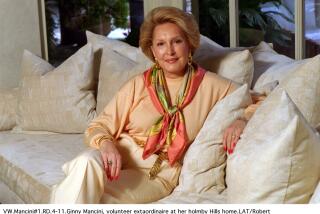APPRECIATION : Henry Mancini: The Romantic Songwriter of Film
- Share via
Henry Mancini, who died Tuesday in Beverly Hills after a long battle with cancer, liked to tell about the day he ran into Blake Edwards outside the Universal commissary. Edwards asked if Mancini would be interested in scoring a television series. Mancini said he would and asked what the series would be called. “Peter Gunn,” Edwards said. Mancini walked away, thinking that it might be fun to do a Western.
But it wasn’t a Western, of course; it was the coolest and most sophisticated private eye show of its time, and the scores Mancini wrote for it--also cool and sophisticated and jazz flavored--brought a new impulse into television music. It was a small combo sound, light and swinging, that blended perfectly with the tone Edwards had set for the show and the urbane association of Craig Stevens and Lola Albright.
The sound was to have had long resonances, launching both Mancini and Edwards on major careers, and it was an association that would extend through two dozen films.
So saying, it is still true that Mancini will be best remembered, not for making the jazz flavoring widely acceptable on the sound track, but as a film composer who was also a great songwriter. (The two arts do not inevitably overlap.)
No one in his generation has outdone Henry Mancini’s lushly romantic scores. And no film composer of his generation has had so many hit songs. The best--”Moon River” most particularly--seem at first hearing to have the quality of half-dreamed, half-remembered ballads, evoking fond thoughts of other times and other places. The songs were all his own, but he infused them with a kind of timeless melodic simplicity. It is a special gift, and one that Mancini shared with Irving Berlin.
There was another story Mancini liked to tell. For a while he and his wife, Ginny, whom he met when both were with the Glenn Miller Orchestra, lived in a house in Holmby Hills that had been owned by Art Linkletter. One Sunday afternoon a family of Japanese tourists checked a map of star houses, spread a cloth and ate their lunch on the lawn. The Mancinis peeked through the curtains, fascinated, as the family tidied up, leaving not a crumb behind.
“I think they thought it was Art’s lawn,” Mancini said. “We hadn’t been there long.” But the visitors might well have thought it was the Mancini home; Hank was being characteristically modest. He was soft-spoken to the point of self-effacement, but he was a perfectionist (and not always a model of patience) on the podium, and he had no doubt that what he did he did very well.
He also had a fine, wry sense of humor, and humor was a quality that also showed up in his music, not in the rim-shot and tin-whistle style of cartoons, but as a brisk and amusing complement to the action.
Mancini was honored with a 70th-birthday banquet in April that raised $2 million for UCLA. It was already known that he was terminally ill, but he had the pleasure--and I’m sure it was--of knowing how many people cared about him.
I wrote some words for him then, and I can do no better than quote some of them again: “I think that no composer has been better than Henry Mancini at creating music which is matchlessly right for what we are seeing, whether the mood is menace, suspense, anguish, elegant comedy, raucous humor or romance anywhere on a scale from flirtation to grand passion. . . .
“I’ve always believed Henry is an unabashed romantic whose soaring melodies and full-bodied sounds create an irresistible inspiration to positive thinking, defiant hope and a warming sense of well-being that says the world can’t be too bad with such richness and talent in it.”
We are less rich now, but the melodies will linger.
More to Read
Only good movies
Get the Indie Focus newsletter, Mark Olsen's weekly guide to the world of cinema.
You may occasionally receive promotional content from the Los Angeles Times.










